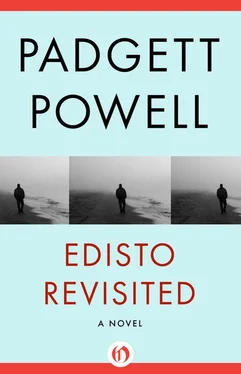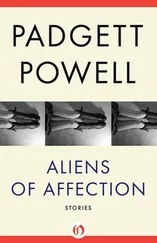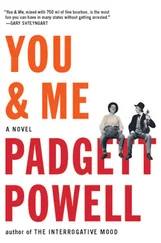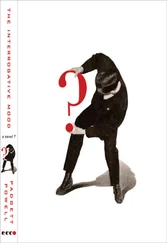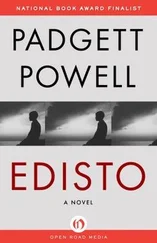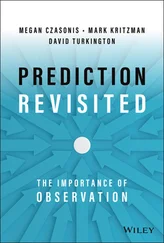I know it will be explained at the office the next morning, in high hilarity and close-call head-shaking sighs. Their discomfort is marginally amusing. Not amusing enough. The General, in his large, loose presumption, is better company than this small, tight presumption of the professionally-taking-itself-seriously.
I spend a night in a giant glass tower of the sort they would have me draw for a living and observe from my window, at intervals, the construction of a receiving awning and the cordoning off of a two-block area by a profusion of at least three kinds of police. Checking out the next morning, I learn that the President is coming for a stay. May he be gay, too.
I stop around the corner at a liquor store — I do not mean to go into Louisiana unarmed — and witness what I take to be a scene, but the players don’t apparently regard it as much. A black man stumbles into the store and is denied a purchase — I miss whether he has no money or whether he has been deemed too drunk to buy more booze. As this denial obtains in his brain, he begins to huff and rumble, finally managing something like, directed at the black clerk, “Fuck you up. ” The clerk says, “Go on.”
“Bsht!” A stagger and a wave that is then, from its momentum only, known to have been a swing at the clerk.
“Get out of here.”
“Fuck you up !”
“I’mone tear you up, nigger,” the clerk says, untying his apron.
That does it. The denied eases out, bumping from jamb to jamb, and the store is back to business as usual. I notice that I am the only customer among five who is white and who has been holding his breath. The others have formed a line ahead of me with their purchases, impatient. I watch the clerk scrupulously to see if he regards me or my transaction any differently from the others, and he does not. Where I come from there would have been apology or dismissal, explanation or gesture made to accommodate me, to persuade me the drunk and the vulgarity were exceptional. Or during the fracas, the clerk might say “Buckra heah.” Here, no. Atlanta is on its own, I take it, racially, and it is the only thing I witness in it that argues I stay. But I do not stay: they are already goosing each other about me in the suites of Eco, Ergo and Ague, and I am going to Louisiana with a banjo on my knee.
Do I expect to find this man? Why, excepting that it is absurd to do so, should I not? Have I not seen my careerist peers panicked by prospect of homosexual contagion, my non-careerist non-peers not panicked by prospect of physical violence, my President panicked by prospect of assassination, when all he wants is a quiet room at the Omni? Is it more absurd to think to find one mysterious man who, as I recall him, was not panicked by anything, in half a million panicked men in Louisiana? Not absurd enough.
I drive a long time. If you prefer old federal highways that are drained of blood by parallel interstates, they are happily drained also of asphalt, and you click and clunk and click down them slowly enough to study the shells and hulls of cinder-block motels and bars clinging to them like cicada husks to moribund trees. I wind up in desolate region in desolate hour, with no motel in sight, and then finally there is one. The breath I hold against No Vacancy turns out to be fanciful when the clerk, a black woman, chuckles, “Sure there’s room,” and I wish immediately maybe there had not been. There are about ten rooms, with most of the doors open at one in the morning and couples in them managing to look at me, led by my key to No. 8. They are all black. The looks are bothered, not uncivil, but containing curiosity run over quickly by resentment. Resenting what, I no longer am naïve enough to wonder. Nor do I wonder how I graduate from the black liquor store and its business to this black whorehouse (as near as I can hazard) with its business — you get in grooves in life, and you by God stay in them until the record plays out. So be it. What I do wonder is why so many doors are open for them to see me, as if each couple is expecting more company, if it is actually couples in the rooms (you have, with your circumspect glance as you watch ostensibly your own feet, time to see only a drink or a bottle, a man or a woman, a hand, a look, an earring, a mustache, another look). I close the door to my room. A card on the table says “Latesha,” like that, in quotes, and then, also in quotes, a phone number.
I call my mother. She’s asleep. Otherwise she would not cooperate.
“Mother.”
“Son.”
“That man I called Taurus, your …”
“My friend.”
“Yes. Where is he?”
“Where is he?”
“Yes.” I expect her to disclaim, fight, dodge, vituper possibly. The interview of one’s mother on the subject of her lovers is not indelicate. My timing — her being nine-parts asleep (agreeable) and one part her true self — allows purchase.
“Where he is, oh. He’s … you did call him Taurus.” She giggles.
“You all let me.”
“If you’d called him Aquarius, we’d have stopped that.” She outright laughs, as if this is much funnier than it is: she is laughing at something else. What, I can’t fathom, and it may have to do with how much (or little — this, too, you never know) she’s had to drink tonight.
“Well, where is this raging bull, Mother?”
“That’s a laidlow to—”
“No, Mother, it’s not. It’s a question.”
I swear to God I hear all the motel doors close and the couples are already moaning. Black sexual moaning sounds like white medical trauma. There is a back room at the Grand I spent some childhood under. “It’s a question, Mother. I want to know where Taurus, stud, is.”
“He’s a game warden in Ville Platte, Louisiana.”
“How did I know he was in Louisiana?”
“Honey, I hardly know how I know he’s in Louisiana.”
“He’s a game warden ?”
“He’s straddling law and law enforcement,” she says. “That’s his … game.”
“I see.”
“No, you don’t.”
“I don’t?”
“No.”
“Why?”
“Because you think you’re smart, but you’re people dumb.”
“I’m people dumb?”
“Eat up with it.”
“He’s your ex-lover, not mine,” I say, wild. There are knocking sounds in deep muffle through the wall to No. 9, into which I did not get a glimpse. I move away from the wall, looking at the floor, expecting to see something leaking through. I get the creeps, but I’m in a domestic engagement. My mother is pulling a partial rear enfilade on the phone. “Your lover grandson to your stroked-out maid, Mother, if I recall correctly.”
“People dumb,” she says, and there is a sound with it that suggests she may be crying, and I hang up. I am crying, too. May the world excuse me. I will not cry over, or with, or for my mother again.
People dumb. She’s right, of course. But what a brutal thing to say. If nothing else, I can live and die and say when it is over, Yes, I came to nothing, but my mother, my mother was a pro.
LOUISIANA WAS A TUNNEL OF improbability. For starters, I could not stop drinking. This, I know, is statistically not improbable if you are bred for it, if you have in your soul the Mendelian, green, wrinkled pea for booze, and I indubitably do, but I had never felt the real pull of it before. Booze has been for me recreation, sideboard theater, camp, a headache. Occasionally, insupportable behavior. Occasionally, magical moments.
But crossing into Louisiana I got this haunted little rill of feeling — there was moss and mud everywhere and an inexplicable, hollow sensation that Louisiana is what would be left of the South after it has been nuked — that I and everything around me were irretrievably rotten. I was passing through this rotten-looking, rotten-sounding town called Slidell and I got some crayfish and ate them with mustard. Pygmy lobsters from the swamp and Zatarain’s mustard from the jar and some kind of sharp whiskey from the bottle, which had the effect of Cowper’s fluid on the crustaceans and mustard going down; I could swear the little things were snapping their tails in what felt like gasoline in my throat, and I felt so bad and out of it — no job, no friends, no Henry Miller — that I felt very, very, very good. I felt like boxing a few rounds with … with live oaks. I felt like driving. And that I did. Somewhere right at the beginning I stopped and asked someone, “Is this Slidell?” and before he could answer yelled, “ I am Slidell,” and drove very slowly away, waving and smiling a huge exaggerated smile at him, or her, it may have been a dog.
Читать дальше
